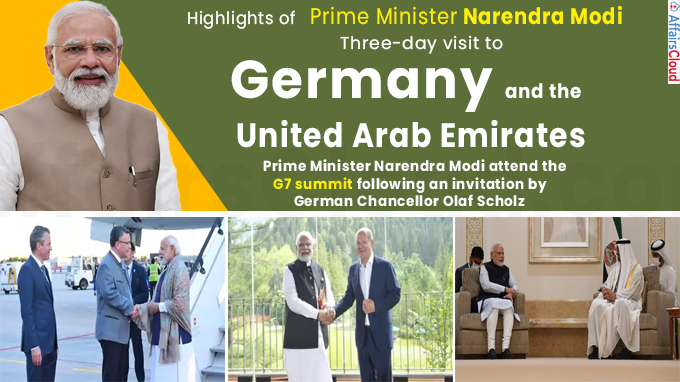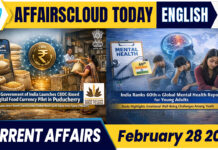
On June 26-28, 2022, the Prime Minister of India Narendra Modi was on a 3-day visit to Germany, and United Arab Emirates (UAE). In the first leg of his visit i.e. on June 26-27 he visited Alpine castle of Schloss Elmau in southern Germany to attend the 48th G7 Summit in 2022 as Guest. He was invited by German Chancellor Olaf Scholz.
- It was hosted by Germany as it is the current chair of G7
- G7 is a grouping of the world’s seven richest nations viz. the United Kingdom (UK), Canada, France, Germany, Italy, Japan and the United States (US).
- Germany previously hosted a G7 summit in 2015 at Schloss Elmau, Bavaria.
Visit to Germany: 2022 G7 Summit
The annual summit of G7 leaders was held where climate action, energy transition, global food security, sustainable development, worldwide food security, gender equality, and the war in Ukraine were the key focus areas.
Participants:
Following table shows the representors of Nations:
| Country | Represented by |
|---|---|
| Germany (Host) | Chancellor Olaf Scholz |
| Canada | PM Justin Trudeau |
| France | President Emmanuel Macron |
| Italy | PM Mario Draghi |
| Japan | PM Fumio Kishida |
| UK | PM Boris Johnson |
| US | President Joe Biden |
| The European Union | Ursula von der Leyen (President of the European Commission) |
| Charles Michel (President of the European Council) |
- Along with India, Argentina, Indonesia, Senegal, South Africa, and Ukraine attended the summit as guest nations.
- It was also attended by G7 GEAC (Gender Equality Advisory Council), International Energy Agency (IEA), International Labour Organization (ILO), International Monetary Fund (IMF), Organisation for Economic Co-operation and Development (OECD), United Nations (UN), World Bank (WB), World Health Organization (WHO), World Trade Organization (WTO).
Reason behind inviting developing nations as Guests:
They have been invited because the agenda of G7 is deep and diverse, and not to cut them off from Russia mainly India.
- It should be noted that, India in recent weeks has spiked energy imports from Russian despite global sanctions on Moscow.
- The goal is to unify around a set of common principles and initiatives.
G7 launches Global Infrastructure Initiative
The G7 group launched a ‘Partnership for Global Infrastructure and Investment'(PGII) initiative to compete with China. Under this, the G7 nations will invest almost 600 billion dollars through in public and private investments by 2027 (next 5 years) to finance infrastructure in developing countries.
Key Points:
i.It is an alternative to the China’s ‘Belt and Road Initiative’ which was initiated in 2013 to open up new trade routes to Europe, Africa, Latin America and in Asia.
ii.It will target low- and middle-income countries for infrastructural investments.
iii.Under this, projects will be made with high standards, and will be commercially and economically viable.
G7 announces Tougher Sanctions against Russia
The G7 called on Russia to end the war against Ukraine, which is now in its fifth month, and also announced a tightening of sanctions against Russia with focus on defence industry, technology sector, oil and gold.
Key Points:
i.The sanctions will also be directed against war criminals and those who profit from Ukrainian grain or gain financially from the war in other ways.
ii.They will also formulate plans to cap the price of Russian oil in discussion with consuming countries and OPEC+ (Organization of the Petroleum Exporting Countries).
iii.G7 formally announce a ban on Russian gold imports which is Russia’s second most lucrative export after energy, and nearly 90% of the revenue comes from G7 countries.
With this ban, $19 billion of Russia’s revenues will be cut off.
- It should be noted that Russia has used gold to support its currency as a way to circumvent the impact of sanctions. One way to do that is by swapping gold for a more liquid foreign exchange that is not subject to current sanctions.
G7 to set up Climate Club
On the suggestion of Chancellor Olaf Scholz, the G7 will establish a Climate Club by the end of 2022. It will an intergovernmental forum consistent with international rules, and is open to countries committed to the 2015 Paris Agreement goal of limiting global temperature increases to 1.5 degrees Celsius (2.7 Fahrenheit) and achieving carbon neutrality by 2050.
Key Points:
i.G7 is committed to a highly decarbonized road sector by 2030, and a fully or predominantly decarbonized power sector by 2035.
ii.G7 invited OECD, IMF, IEA, and WTO to support this process.
This upcoming Climate Club will be based upon the following 3 pillars:
i.Advance and transparent climate mitigation policies to reduce emission intensities
ii.Transform industries jointly to accelerate decarbonization
iii.Establish international partnerships to encourage and facilitate climate action and promote energy transition
G7’s Financial Commitments:
i.G7’s financial support to Ukraine in 2022 exceeds USD 2.8 billion in humanitarian aid, and they have also pledged an additional USD 29.5 billion in budget aid.
ii.They also committed to an additional USD 4.5 billion for 47 countries and regional organizations dealing with food insecurity and malnutrition, amounting to a total of over USD 14 billion towards global food security in 2022.
G7, India and 4 other Countries Pledge to protect Online & Offline Free Speech
The leaders from G7 nations and its 5 guest countries, including India, committed to open public debate and the free flow of information online and offline while guarding the freedom, independence and diversity of civil society actors. The Other 4 Guest Countries are Argentina, Indonesia, Senegal and South Africa.
During the summit, they had issued the joint statement titled ‘2022 Resilient Democracies Statement’.
Other commitments in G7 summit:
i.They also pledged to ensure an open, free, global, interoperable, reliable and secure internet; increase the cyber resilience of digital infrastructure, including by improving and sharing awareness of cyber threats and expanding cyber response cooperation and counter hybrid threats, in particular, information manipulation and interference, including disinformation.
ii.They agreed to cooperate to counter information manipulation, promote accurate information and advocate for shared democratic values worldwide.
iii.They also pledged to enhance transparency about the actions of online platforms to combat violent, extremist and inciting content online in line with the Christchurch Call to Action.
- The Christchurch Call is a commitment by governments and tech companies to eliminate terrorist and violent extremist content online.
iv.Leaders agreed to promote academic freedom and strengthen the role of scientific evidence and research in democratic debate.
Other Highlights:
i.PM Narendra Modi met German Chancellor Olaf Scholz in Elmau, Germany where both leaders agreed to continue India-Germany Strategic Partnership, and diversifying the bilateral friendship for the benefit of their people and the entire planet.
ii.PM also met the President of the European Commission, Ursula von der Leyen on the sidelines of the G7 Summit, and reviewed India-EU engagements in various sectors, including digital cooperation, climate action and technology & innovation. They also exchanged views on contemporary global and regional developments.
iii.During a session on ‘Investing in a better Future: Climate, Energy, Health’ of Summit, PM Narendra Modi highlighted emerging huge market for clean energy technologies in India.
- He also invited G7 member countries to invest in the fields of research, innovation and manufacturing.
iv. The Prime Minister, Narendra Modi also addressed the session on ‘Stronger Together: Addressing Food Security and Advancing Gender Equality’.
PM Narendra Modi’s gifts to G7 Leaders:
The PM had taken along a plethora of such artistic gifts for each of the G7 leaders which include the following:
i.The Indian PM gifted a gulabi meenakari brooch and cufflink set to US President Joe Biden. The cufflinks were specially prepared for the President with a matching brooch for the First Lady.
- Gulabi Meenakari is a GI-tagged art form of Varanasi in Uttar Pradesh (UP).
ii.Pieces of black pottery from Nizamabad, UP were gifted to Japanese PM Kishida Fumio,.
iii.A Nandi-themed dokra art piece sourced from Chhattisgarh was presented to Argentina President Alberto Fernandez.
iv.A hand-painted tea set from UP’s Bulandshahr was meant for British Prime Minister Boris Johnson.
v.French President Emmanuel Macron got a selection of Kannauj’s ittar bottles that were packed in a custom-made zardozi box from Lucknow, UP.
vi.Italian PM Mario Draghi was gifted a marble inlay table top that had its origins in Agra,UP.
vii.Senegal President Macky Sall was presented a range of moonj baskets and cotton durries that were sourced from Prayagraj, Amethi and Sultanpur in UP.
viii.A handmade knotted silk carpet from Kashmir was gifted to Canadian PM Justin Trudeau, while German Chancellor Olaf Scholz was presented a metal marodi carving matka from Moradabad, “Brass City” of UP.
ix.PM gifted Dokra -Art -Piece based on the Ramayana theme to South Africa’s Presiden, Cyril Ramaphosa.
x.PM gifted Lacquerware Ram Durbar to Indonesian president, Joko Widodo.The GI-tagged lacquerware art-form has its roots in the temple town of Varanasi, UP.
Visit to Abu Dhabi, UAE:
On June 28, 2022, he had a brief stopover in Abu Dhabi, UAE to pay his condolences on the passing away of Sheikh Khalifa bin Zayed Al Nahyan, the former president of UAE. There he met PM and President of the UAE and Ruler of Abu Dhabi His Highness Sheikh Mohamed bin Zayed Al Nahyan.
- Sheikh Khalifa was the eldest son of UAE’s founder President Sheikh Zayed bin Sultan Al Nahyan. He served as the President of the UAE and ruler of Abu Dhabi from November 3, 2004 till his death.
Key Points:
i.The UAE was India’s third-largest trading partner for the year 2019-20 after China and US.
ii.The UAE is the third-largest export destination of India (after the US and China) with an amount of nearly USD 16 billion for the year 2020-21.
iii.For the UAE, India is the third-largest trading partner for the year 2020 with an amount of around USD 27.93 billion (non-oil trade).
About Germany:
Capital– Berlin
Currency- Euro
President– Frank-Walter Steinmeier
About United Arab Emirates (UAE):
Capital– Abu Dhabi
Currency– Dirham
President– Mohammed bin Zayed Al Nahyan




